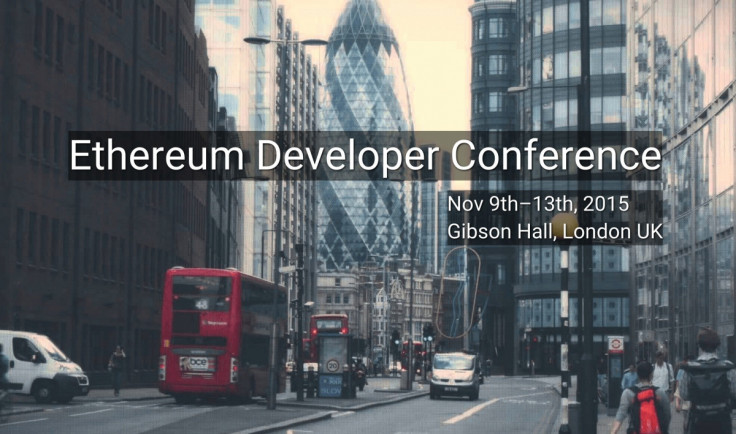Ethereum DevCon1: 'We can fix the internet – and we can do it this week'

Devcon1, the Ethereum conference being held in the City of London all this week, was kicked off by its inventor and chief scientist Vitalik Buterin, who stated that scalability and privacy of the blockchain would be priorities going forward.
These are vital issues for enterprise users such as banks and other corporates looking at blockchain technology, basically all the people sitting at the back of the room wearing suits.
Ethereum's vision is a more decentralised internet, a more secure and trustworthy environment. Bitcoin has provided a lightning rod for a new era of shared, unmediated value transfer that has the potential to affect practically anything connected to the web. Ethereum is working at the frontier of this process so understandably the discussions are quite technical.
Buterin said: "Scalability is this idea of coming up with a blockchain that can scale much larger than existing chains essentially by processing transactions in parallel. And moving away from this paradigm where every single node on the network has to process every single transaction.
"There are a number of different ways to do that and we will be hearing about a lot of the different strategies from many people throughout this week. I think that is the single technical thing that's right now holding blockchain technology back more than anything else."
Privacy
Buterin pointed out privacy is the another major factor which makes the blockchain unsatisfactory for at least some use cases. He said: "You know companies are all interested in blockchains, they love blockchains – it's the new buzzword, it's the future.
"But wait ... You are saying we have to publish every single one of our transactions to a public database that can be read by our competitors? The question is how can you have the benefits of the transparency of the blockchain without compromising your privacy?
"There is a wonderful area of cryptography called zero knowledge proofs that is somehow magically using a bunch of algorithms involving mathematical transforms on binary circuits to do exactly that."
But wait ... You are saying we have to publish every single one of our transactions to a public database that can be read by our competitors?
Buterin mentioned a project called Zerocash in this regard, which puts zero-knowledge Succinct Non-interactive ARguments of Knowledge (zk-SNARK) into a bitcoin-like cryptocurrency. Zerocash creates a separate anonymous currency, existing alongside a (non-anonymous) base currency. Each user can convert (non-anonymous) basecoins into (anonymous) Zerocash coins.
He continued: "There are also many other applications of privacy ranging from things like proving that you are a reliable trustworthy person by some kind of reputation metric, or identity registry system, without actually revealing what your specific name is. Figuring out how to integrate that into Ethereum is one of our primary focuses."
The move to proof of stake via the Casper algorithm and upgrading the Ethereum virtual machine (EVM) are also high on the agenda and the subject of many of this week's talks, said Buterin.
"Initially I thought that Ethereum was a thing that would be used for people to write simple financial scripts. As it turns out people are writing stuff like Augur on top of it. So figuring out how to make the virtual machine really work is another topic we will be discussing this week."
Ethereum wallet
Following on from the roadmap talks was an inspiring presentation from Ethereum wallet designer Alex van de Sande. He began by saying that while the blockchain is a powerful tool, it requires mass adoption and this means reaching out to "that mythical creature" – the average user.
Van de Sande said this means someone like a modern office worker, or "power user". He said: "The purpose of the wallet is actually to bridge the gap between the developer and the power user."
Van de Sande then showed off an Ethereum shared, multi-signature wallet, which allows people to move money around. He then showed how the wallet user could create their own token by copying and pasting some code. These tokens can then be split among wallet users and used to cast votes on given proposals about moving the funds around etc.
He said: "We have created a virtual organisation that is a democratic organisation and lives only on the blockchain that can hold funds and use tokens as voting shares. All the public information about it is listed, all the proposals. Anyone who wants to follow the contract on the blockchain will be able to see all the proposals. It's very transparent. Let's call it Blockchain unlimited.
"To vote on a proposal say either 'yes' or 'no', click execute and type in your password. The blockchain can count the votes, if the proposal passes it will send some money, if not it will keep the money – simple as that.
"We just created a company that only exists on the blockchain that holds real money that can do real world things with that money – it can hold gold, it can hold shares, anything you want." Van de Sande said this wallet with a browser bar attached is an example of how Mist would work.
He added: "Today the internet is so centralised, it kind of sucks. The internet is broken. We can build a better internet together. We can fix the internet – and we can do it this week."
© Copyright IBTimes 2025. All rights reserved.






















